James C. Kaufman, PhD, Series Editor
Director, Learning Research Institute California State University at San Bernardino
Alan S. Kaufman, PhD, is Clinical Professor of Psychology at the Yale University School of Medicine, Child Study Center. Kauf man earned an AB degree from the University of Pennsylvania in 1965; an MA in Educational Psychology from Columbia University in 1967; and a PhD from Columbia University in 1970 (under Robert L. Thorndike in Psychology: Measurement, Research, and Evaluation). While Assistant Director at The Psychological Corporation from 1968 to 1974, Kaufman worked closely with David Wechsler on the revision of the Wechsler Intelligence Scale for Children (WISC) and supervised the standardization of the revised versionthe WISC-R. He also collaborated with Dorothea McCarthy in the development and standardization of the McCarthy Scales of Childrens Abilities. From the mid-1970s to the present, Kaufman has held several university positions prior to his current professorship at Yale, most notably at the University of Georgia (19741979) and the University of Alabama (19841995). Kaufmans texts, including Intelligent Testing With the WISC-R (1979), Assessing Adolescent and Adult Intelligence (1990), and Intelligent Testing With the WISC-III (1994), have been widely used for the interpretation of Wechslers scales for children, adolescents, and adults. In 2009 he coauthored Essentials of WAIS-IV Assessment (with Liz Lichtenberger) and the second edition of Essentials of WISC-IV Assessment (with Dawn Flanagan). Kaufmans tests, developed with his wife Nadeenmost notably the 1983 Kaufman Assessment Battery for Children (K-ABC) and its 2004 revision (KABC-II) have been widely used throughout the world to measure childrens intelligence. Kaufman is a Fellow of four divisions of the American Psychological Association (APA) and of the Association for Psychological Science (APS) and is a recipient of the Mensa Education and Research Foundation Award for Excellence (1989) and the Mid-South Educational Research Association Outstanding Research Award (1988 and 1993). In 1997, he received the APAs prestigious Senior Scientist Award from Division 16 (School Psychology), and in 2005 he delivered the Legends in School Psychology Annual Address to the National Association of School Psychologists (NASP).
IQ
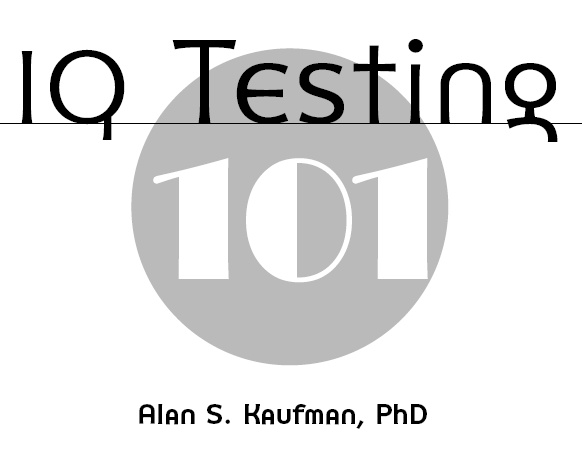
Testin g
10
Alan S. Kaufman, PhD

Copyright 2009 Springer Publishing Company
All rights reserved.
No part of this publication may be reproduced, stored in a retrieval system, or transmitted in any form or by any means, electronic, mechanical, photocopy ing, recording, or otherwise, without the prior permission of Springer Publishing Company, LLC, or authorization through payment of the appropriate fees to the Copyright Clearance Center, Inc., 222 Rosewood Drive, Danvers, MA 01923, 9787508400, fax 9786468600, info@copyright.com or on the web at www .copyright.com.
Springer Publishing Company, LLC 11 West 42nd Street New York, NY 10036 www.springerpub.com
Acquisitions Editor: Philip Laughlin Project Manager:Mark Frazier Cover design: Mimi Flow Composition: Apex CoVantage, LLC
Ebook ISBN: 9780-826122360
09 10 11 / 5 4 3 2 1
Library of Congress Cataloging-in-Publication Data
Kaufman, Alan S., 1944 IQ testing 101 / Alan S. Kaufman.
p. cm. Includes bibliographical references and index. ISBN 978-0-8261-0629-2 (alk. paper)
1. Intelligence tests. I. Title. II. Title: IQ testing one hundred one.
III. Title: IQ testing one hundred and one. BF431.K387 2009 153.9'3dc22 2009014901
Printed in the United States of America by Hamilton Printing
The author and the publisher of this Work have made every effort to use sources believed to be reliable to provide information that is accurate and compatible with the standards generally accepted at the time of publication. Because medical science is continually advancing, our knowledge base continues to expand. Therefore, as new information becomes available, changes in procedures become necessary. We recommend that the reader always consult current research and specific institutional policies before performing any clinical procedure. The author and publisher shall not be liable for any special, consequential, or exemplary damages resulting, in whole or in part, from the readers use of, or reliance on, the information contained in this book. The publisher has no responsibility for the persistence or accuracy of URLs for external or third-party Internet Web sites referred to in this publication and does not guarantee that any content on such Web sites is, or will remain, accurate or appropriate.
To James Corey Kaufman A bright, shining light as a child Who has grown into a remarkable Renaissance Man
He is a gifted playwright, professor, researcher, author , and mentor
He not only possesses enormous creativity, but his ongoing innovative research on creativity has revolutionized the field
He is my colleague and best friend, and, to me, he will always be Jamie
This page intentionally left blank
Contents
| Chapter 4 | 103 |
|---|
| Chapter 5 | 137 |
|---|
| Chapter 6 | 171 |
|---|
| Chapter 7 | 201 |
|---|
| Chapter 8 | Hot TopicIQ and Aging: Do We |
|---|
| Old Age? | 223 |
| Chapter 9 |
| Forum: Lead Level, Learning |
| Disabilities, and IQ | 249 |
| Chapter 10 | 287 |
| References | 301 |
| Index | 335 |
I am extremely grateful to three psychologists, Dr. Ron Dumont, Dr. Darielle Greenberg, and Dr. John Willis, who read an earlier draft of the entire manuscript and who made dynamic contri butions to IQ Testing 101 with their incisive edits, their suggestions, their corrections, and their challenging questions. Their contributions were exceptional and highly valued, as was that of Dr. Linda Silverman, who provided historical insights into Guilfords theory and read carefully the sections on intelligence theories. I am also thankful to Ms. Cynthia Driscoll, an attorney with a specialty in lead litigation, for her helpful comments on the section about the effects of blood lead on childrens IQs.
An enormous debt of gratitude is due to Pearson Assessmentsespecially to Mr. William Schryver, Dr. Larry Weiss, Dr. Mark Daniel, Dr. Susan Raiford, Dr. Aurelio Prifitera, and Dr. Carol Watsonfor allowing me to include figures, numerous illustrative test items, and quotations from a variety of tests and products that they publish. The sample items helped bring to life the nature of the tasks that compose the individually administered clinical IQ tests designed for children and adults. The quotations contributed greatly to the portion of chapter 9 devoted to the assessment of specific learning disabilities. All Flanagan, Kaufman, Kaufman, and Lichtenberger (2008) quotations that appear in chapter 9 are from a videotaped training program devoted to the Best Practices for identifying children

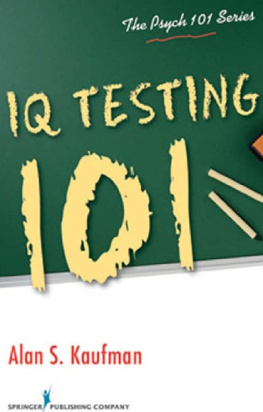



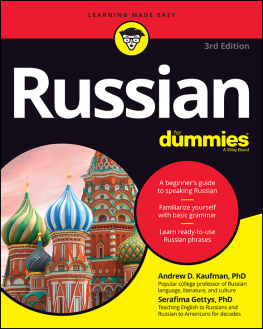



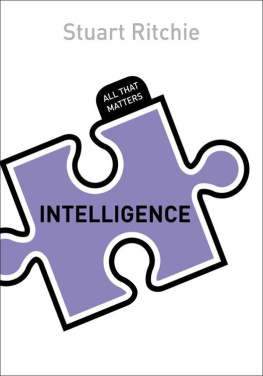

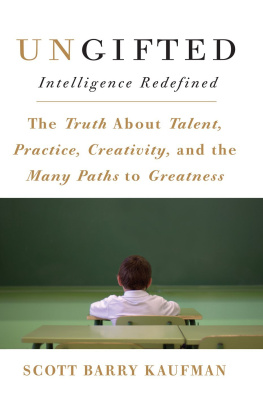

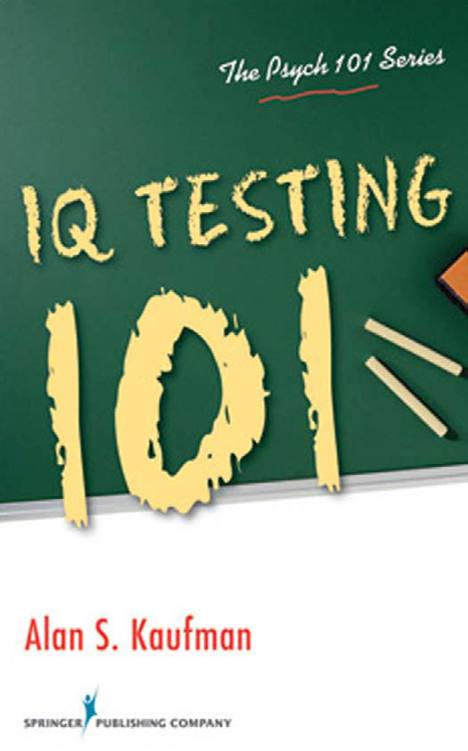
 Testin g
Testin g